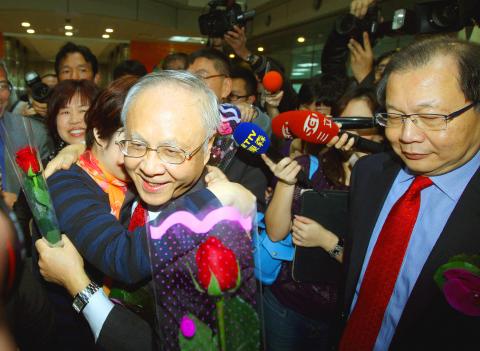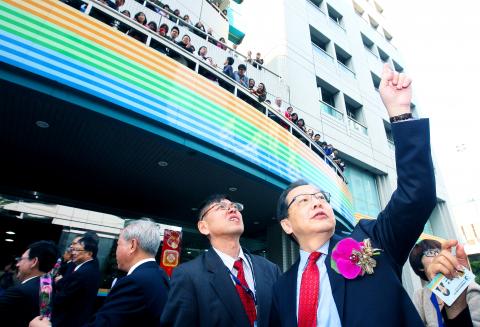Chunghwa Telecom Co’s (中華電信) new chairman, Rick Tsai (蔡力行), yesterday promised to safeguard the interests of shareholders and employees amid pressure from the government to give rivals access to the company’s local loop.
The 62-year-old Tsai, who took the helm of the nation’s largest telecom operator from Lee Yen-sung (李炎松) yesterday, said he would work to bridge the communication gap between the company and the Ministry of Transportation and Communications, which is pushing for the opening of the company’s “last-mile” access.
The last mile is the crucial final connection to subscribers’ residences or places of work.

Photo: CNA
“I’ll keep communicating with the government to create a win-win situation,” Tsai said in his inauguration speech.
The former Taiwan Semiconductor Manufacturing Co (TSMC, 台積電) chief executive officer said he also looks forward to building a close relationship with the company’s 24,000 employees.
Prior to the handover ceremony, Tsai phoned up Chunghwa Telecom Workers Union chairman Chu Chuan-ping (朱傳炳), who earlier this month submitted a petition to Chinese Nationalist Party (KMT) vice chairman Tseng Yung-chuan (曾永權) expressing the union’s opposition to Tsai’s appointment.

Photo: CNA
The union believes it is unfair for Chunghwa Telecom to open its “last mile” access to local rivals.
However, union members yesterday canceled a planned protest at the handover ceremony “for reasons related to the phone call,” a person told the Taipei Times on condition of anonymity.
For years, Chunghwa Telecom has been reluctant to give up its last-mile monopoly, given the massive investment it has made to build most of the nation’s telecom infrastructure.
In 2012, the National Communications Commission proposed amendments to the Telecommunications Act (電信法) requesting that the company share its last-mile access with rivals. However, the Cabinet has twice suspended planned evaluations of the proposals, once in October 2012 and in July last year.
Tsai also yesterday said he is confident that the company will perform better than has been forecast, but did not disclose specifics about his strategy plans.
Chunghwa Telecom aims to become the first in Taiwan to launch 4G services this year as soon as the second half of this year, he added.
To prepare for the launch of 4G services, the company has decided to increase its capital expenditure to NT$40.13 billion (US$1.32 billion) this year from NT$36.41 billion last year.
Driven by an increase in sales of its wireless services, the company reported a net profit of NT$9.36 billion, or NT$1.21 per share, last quarter, up 3.4 percent from NT$9.05 billion a year ago, according to its financial report. But the results were 12.11 percent lower than the previous quarter.
Earnings before interest, tax, depreciation and amortization (EBITDA) — which provides a better gauge of big-capex telecom companies’ profitability — were NT$19.27 billion last quarter, declining 6.68 percent from the previous quarter, but rising 0.4 percent from the same period of 2012, the company’s data showed.
EBITDA margin declined to 32.8 percent last quarter, from 36.4 percent in the third quarter and 34.1 percent in the fourth quarter of 2012, because of tariffs cuts and an increase in handset sale costs, the company said.
For the whole of last year, net profit was NT$38.7 billion, or earnings per share of NT$5.14.
With increased expense on 4G services, Chunghwa Telecom forecast net profit would fall 7.39 percent this year to NT$35.84 billion or NT$4.62 per share.
EBITDA is expected to fall 3.4 percent to NT$77.1 billion this year from last year, while total revenue is to increase slightly by 0.1 percent to NT$228.23 billion, the company predicted.

SEMICONDUCTORS: The firm has already completed one fab, which is to begin mass producing 2-nanomater chips next year, while two others are under construction Taiwan Semiconductor Manufacturing Co (TSMC, 台積電), the world’s largest contract chipmaker, plans to begin construction of its fourth and fifth wafer fabs in Kaohsiung next year, targeting the development of high-end processes. The two facilities — P4 and P5 — are part of TSMC’s production expansion program, which aims to build five fabs in Kaohsiung. TSMC facility division vice president Arthur Chuang (莊子壽) on Thursday said that the five facilities are expected to create 8,000 jobs. To respond to the fast-changing global semiconductor industry and escalating international competition, TSMC said it has to keep growing by expanding its production footprints. The P4 and P5

DOWNFALL: The Singapore-based oil magnate Lim Oon Kuin was accused of hiding US$800 million in losses and leaving 20 banks with substantial liabilities Former tycoon Lim Oon Kuin (林恩強) has been declared bankrupt in Singapore, following the collapse of his oil trading empire. The name of the founder of Hin Leong Trading Pte Ltd (興隆貿易) and his children Lim Huey Ching (林慧清) and Lim Chee Meng (林志朋) were listed as having been issued a bankruptcy order on Dec. 19, the government gazette showed. The younger Lims were directors at the company. Leow Quek Shiong and Seah Roh Lin of BDO Advisory Pte Ltd are the trustees, according to the gazette. At its peak, Hin Leong traded a range of oil products, made lubricants and operated loading

The growing popularity of Chinese sport utility vehicles and pickup trucks has shaken up Mexico’s luxury car market, hitting sales of traditionally dominant brands such as Mercedes-Benz and BMW. Mexicans are increasingly switching from traditionally dominant sedans to Chinese vehicles due to a combination of comfort, technology and price, industry experts say. It is no small feat in a country home to factories of foreign brands such as Audi and BMW, and where until a few years ago imported Chinese cars were stigmatized, as in other parts of the world. The high-end segment of the market registered a sales drop

SinoPac Financial Holdings Co (永豐金控) said yesterday that it plans to buy 100 percent of King’s Town Bank (KTB, 京城銀行) for NT$60 billion (US$1.83 billion) through cash and share swaps. The two financial institutions would seek approval from regulators and shareholders next year, after respective board directors yesterday gave the green light, SinoPac spokesperson Kerry Hsu (許如玫) told reporters at the Taiwan Stock Exchange last night. SinoPac would sponsor the deal with 50 percent in cash and the remaining half through a share swap scheme, Hsu said. Under the share swap arrangement, one common KTB share would trade for 1.15 SinoPac shares,